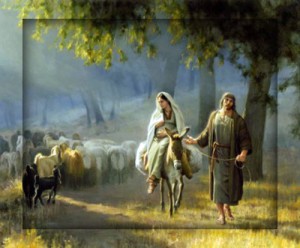It has been common since at least the time of the Puritans to claim Christians began celebrating Christ’s birth on December 25 in an effort to change the emphasis of a day associated with a pagan festival—much like some Christians today hold “fall festivals” in lieu of Halloween. American Puritan Increase Mather, for instance, said “the early Christians who first observed the Nativity on December 25 did not do so thinking that Christ was born that month but because the heathen’s Saturnalia was at that time kept  in Rome, and they were willing to have those pagan holidays metamorphosed into Christian.”[1] But a group of contemporary scholars, drawing on ancient writings from as early as the second century, suggests that December 25 is well within the realm of possibility as the real date.
in Rome, and they were willing to have those pagan holidays metamorphosed into Christian.”[1] But a group of contemporary scholars, drawing on ancient writings from as early as the second century, suggests that December 25 is well within the realm of possibility as the real date.
Holding a pagan festival December 25 may have originated with the Roman emperor Aurelian, who in AD 274, built a temple and established games every four years to honor the pagan sun god to whom he attributed military victories. An ancient calendar for the year AD 354 notes such games on December 25 in celebration of the “birthday of the inconquerable sun” (Sol Invictus). [2] The timing made good sense, for, with the winter solstice, the sun had just hit its “low water mark” in the northern hemisphere. The days were short, the weather cold, the leaves fallen, the crops idle—a perfect time for superstitious people to schedule a hopeful rally for the return of summer.
This sort of thing had been going in Rome since centuries-ago BC in the form of winter-solstice parties for Saturn, the god associated with agriculture and light, parties characterized by candles and gift giving. Some suggest other pagans throughout Europe employed evergreens and yule logs in their own December observances, hoping to stimulate the restoration of greenery and warmth. But all these similarities could be coincidental. Or, to put it otherwise, December might have been both the real birth month for Jesus and the time of traditional solstice observances, supplanted by Christmas, albeit with some of the accoutrements retained. (Similarly, Jesus’ resurrection could have been in the spring, happening to coincide with fertility festivals—hence, the tradition of Easter eggs.)
The same codex (book) containing the aforementioned calendar also marks Christ’s birthday on December 25 in a section likely dating to AD 336—the earliest undisputed evidence Christians commemorated the nativity on that date. Some have concluded from the notation of both holidays in the same codex that the celebration of Christ’s birth on that date derived from the celebration of Sol Invictus’s birth as an effort to Christianize the pagan holiday.[3] But if Roman Christians were seeking to supplant the festival of Sol Invictus with Christmas, it’s fair to ask why they would have continued to note the former. It seems reasonable to say that an effort to change the significance of December 25 would have dropped the reference to the pagan observance.
Further, writings of church fathers before AD 274 mention the celebration of Christmas on December 25. Most manuscripts of a commentary on Daniel likely written between AD 202 and 211 by Hippolytus of Rome state, “The first advent of our Lord in the flesh, when he was born in Bethlehem, was December 25, a Wednesday.” The Greek scholar who translated Hipploytus’ commentary into English believes the reference to December 25 was part of the original rendering.[4] Similarly, Clement of Alexandria (c. 150-c. 215) seemed to situate Christ’s birth in late fall or early winter in his Stromata.[5] Two centuries later, Augustine and Jerome both reported tradition placed Christ’s birth on December 25.[6]
Finally, a Christian tradition likely dating to at least the second century held Jesus died on the same date He was conceived, March 25. Adding nine months to that date would place His birth around December 25. Among the church fathers to advocate a March 25 conception date were Julius Africanus (160-240) and Gregory Thaumaturgus (c. 213-270).[7]
Of course, we cannot know the date of Jesus’ birth with certainty, and it’s not critical that we do as we follow the discussion through the years. Some have argued shepherds would not have kept watch over their flocks by night (Luke 2:8) during the winter months, and therefore Jesus could not have been born on December 25. But that argument is inconclusive.[8] And claims to know the date of Jesus’ conception seem dubious. And again, some Christian holidays did, in fact, assume dates previously reserved for pagan festivals.[9] Still, the evidence gives ample reason to question the common claim that the exact date of December 25 was devoted to a pagan festival before it marked a Christian holiday.
________________________________
Endnotes
[1] Lenny Esposito, “No, Christmas Is Not Based on a Pagan Holiday,” Come Reason Ministries Website, December 16, 2015, http://apologetics-notes.comereason.org/2015/12/no-christmas-is-not-based-on-pagan.html (accessed December 19, 2015).
[2] Kurt M. Simmons, “The Origins of Christmas and the Date of Christ’s Birth,” Journal of the Evangelical Theological Society 58/2 (2015): 301.
[3] Ibid.
[4] Thomas Schmidt, “Hippolytus and the Original Date of Christmas,” Chronicon Blog, November 21, 2010, http://web.archive.org/web/20130303163053/http:/chronicon.net/blog/chronology/hippolytus-and-the-original-date-of-christmas (accessed December 19, 2015). Schmidt notes that “most scholars believe that the date of December 25 was added by a later scribe and that Hippolytus did not record it himself.”
[5] Clement of Alexandria, Stromata, 1.21.145-146.
[6] Augustine, Sermon 202; Jerome, Homily 88: On the Nativity of Christ, as cited in Simmons, “The Origins of Christmas and the Date of Christ’s Birth,” 310n26.
[7] Ibid., 303-310.
[8] Andras Kostenberger and Alexander Stewart, The First Days of Jesus (Wheaton, IL: Crossway, 2015), 146.
[9] Simmons, “The Origins of Christmas and the Date of Christ’s Birth,” 301.
